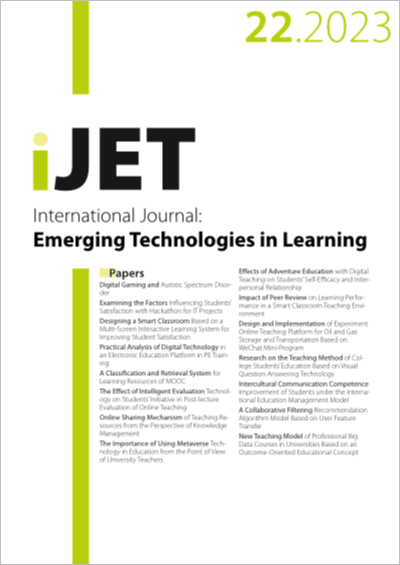Effects of Adventure Education with Digital Teaching on Students’ Self-Efficacy and Interpersonal Relationship
DOI:
https://doi.org/10.3991/ijet.v18i22.43925Keywords:
digital teaching, adventure education, self-efficacy, interpersonal relationshipAbstract
The rapid emergence of digital technology changes global appearance and intangibly affects people’s thinking and lifestyles, making it the leading force that cannot be ignored. Countries around the world, realizing the importance of digital learning and information technology in education, have proposed relevant programs. There is overall or local planning, from basic environment building to changes in students’ learning models. Considering the deep influence of digital teaching on students’ learning experiences and teaching mechanisms, the emergence of “digital education” is a positive response to education. In an experimental research study conducted in south-central Taiwan, a cohort of 214 college students underwent an 18-week experimental teaching exercise (amounting to 48 hours, at three hours per week). The data was then scrutinized using SPSS 12.0. The findings delineated two primary outcomes: 1) When juxtaposed with conventional teaching methodologies, the infusion of digital teaching into adventure education led to pronounced improvements in students’ self-efficacy and interpersonal relationships. 2) A discernible positive correlation was observed between students’ self-efficacy and their interpersonal relationships. Drawing upon these results, it’s inferred that both self-efficacy and interpersonal relationships can be bolstered through judicious curriculum design. In light of these insights, the study offers several recommendations. The overarching aspiration is to not only foster a self-directed learning proclivity among students, making them better equipped to navigate life, but also to offer them the tools and guidance to pinpoint and realize their aspirations and ideals.
Downloads
Published
How to Cite
Issue
Section
License
Copyright (c) 2023 Chich-Jen Shieh (Submitter); Wen-Jung Tsai, Shuen-Huei Yao

This work is licensed under a Creative Commons Attribution 4.0 International License.



